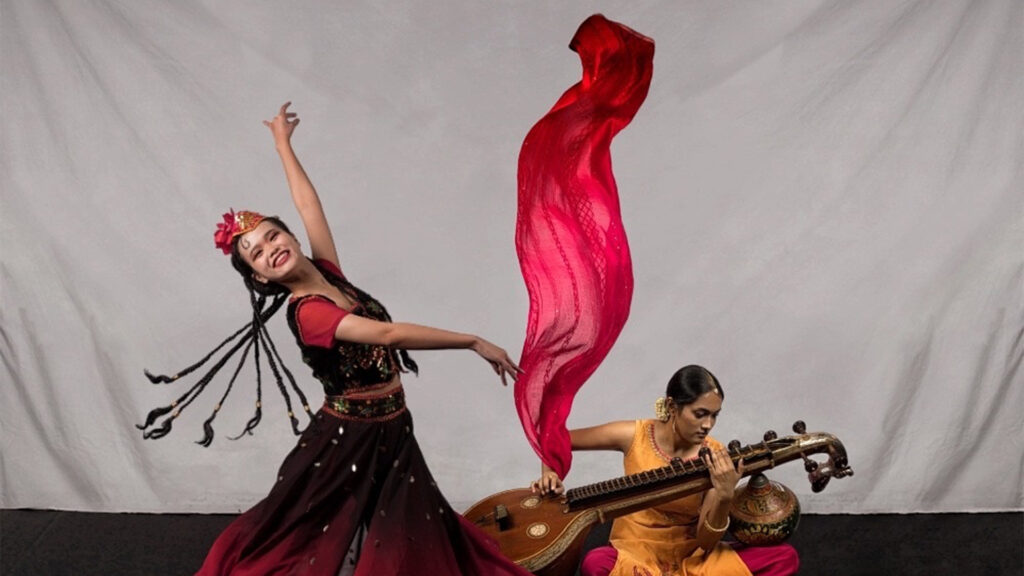Exploring the Spaces between the Arts, Social Issues and Academia
March 12, 2023
IN BRIEF | 8 min read
- This year’s edition of NUS Arts Festival features over 20 performances, films, public art, installations, and dialogues. It is also the first to return to pre-pandemic levels, and involves more than 700 NUS students, alumni, faculty, staff and collaborators, nearly twice of 2022 figures, and remains the largest performing arts event on campus..

What can we learn from uncomfortable transitions and ambiguous spaces? The highlight of NUS’ performing arts calendar, NUS Arts Festival 2023: Spaces Between, returns to campus from 10 to 26 March 2023, and explores the idea of liminal spaces and the exciting, yet uncomfortable unknown that accompanies the transition between phases and states.
This year's theme, Spaces Between, is the finale to a trilogy of themes that began with A Question of Time in 2021 and Shades of Light(ness) in 2022. All three are universal concepts that drive the purpose of our everyday lives.
This year’s edition of NUS Arts Festival features over 20 performances, films, public art, installations, and dialogues. It is also the first to return to pre-pandemic levels, and involves more than 700 NUS students, alumni, faculty, staff and collaborators, nearly twice of 2022 figures, and remains the largest performing arts event on campus.
“The purpose of the festival theme is to allow us to reflect on the times we live in through art. Furthermore, art has always been a vehicle in which we rediscover ourselves, encounter a confluence of different ideas, and ask difficult questions,” said Festival Director, Jobina Tan.
“As we live in a world of diverse and divided views, I hope the theme demonstrates our perennial need to constantly negotiate between varied perspectives and find more meeting points with each other."
Professor Audrey Yue, Head of Department of Communications and New Media, and Festival Faculty Advisor, added, “While we recover from the downturn of the pandemic, we also arrive at the intersection of concurrent crises including global economic, racial and geopolitical unrests. How do we boldly unfold and spring forth from the complexity of this conjunction?”
Indeed, the theme has inspired a bumper crop of interdisciplinary artistic collaborations, bringing together different art forms, student groups, and academic departments. Many of these are rare partnerships or first-of-its-kind pairings within NUS, with a handful pushing the envelope to address contemporary issues which resonate with youths in Singapore.
One such collaboration is the festival opening show, Inter/change, which marries the two contrasting traditional art forms practiced by NUS Chinese Dance and NUS Indian Instrumental Ensemble. Led by Artistic Director, Jenny Neo, dance choreographer, Xiao Jing, and musician Nawaz Mirajkar, the production is inspired by the history and evolution of the Silk Road as well as its cultural impact and relevance in our world today.
“Inter/change allows us to explore and interpret the theme as spaces between two different parts of the world joined together by the Silk Road, as well as the idea of spaces between different viewpoints, ideologies and cultures. The idea of liminality can possibly be explored through the interactions between these two civilisations and through the comparisons which highlight similarities between the Indian and Chinese ways of life,” said Lee Ruo Shi, Dance Captain of NUS Chinese Dance, and a second-year Accountancy student.
Another unique collaboration is Essentially Macbeth, featuring NUS Chinese Drama and NUS Chinese Orchestra. A Chinese language play-within-a-play, the production follows the lives of young graduates who reconnect with theatre after a pronounced absence, and questions the relevance of the arts in our everyday lives. The play is inspired by the public conversations about artists being considered “non-essential” workers in Singapore, during the COVID-19 pandemic.
“I suggested to Moses, conductor of NUS Chinese Orchestra to let NUS Chinese Drama and NUS Chinese Orchestra tackle a Western classic by Shakespeare. Moses suggested getting composer Phang Kok Jun to write original music for this daring piece of work. I think we both saw this as a chance to play, learn and explore new boundaries for our art form,” said NUS alumna Judy Ngo, who directs the play.

Presented by Malay cultural dance group NUS Ilsa Tari, together with NUS Dikir Barat, Pengabdian Batin (or “Inner Enslavement” in Malay) aims to deconstruct the stigma surrounding Intimate Partner Violence amongst the Malay/Muslim community. This production is helmed by Artistic Director, Osman Abdul Hamid.

Promise of a Future celebrates the union of artists and their art forms, bringing the largest number of performers on stage within the festival. Some 182 musicians from NUS Symphony Orchestra, The NUSChoir, and NUS Yong Siew Toh Conservatory of Music, will present musical interpretations of the triumph of hope over uncertainty, which includes Mozart’s famous Coronation Mass. This is the first in-person collaboration between NUS Symphony Orchestra and The NUSChoir since 2018.
“Now that we are back to pre-pandemic productions, watching everything unfold again at full scale, how it was meant to be, is far grander and exciting than what any of us could've imagined. It's certainly only a special, magical moment that you can only feel it in person, live, either as a performer on stage or an audience,” said Wong Ting Feng, President of NUS Symphony Orchestra, and a fourth-year Philosophy, Political Science, and Economics student.
The NUS Arts Festival is generously supported by donors, namely, Hong Leong Foundation, Shaw Foundation, Kwan Im Thong Hood Cho Temple, The Ngee Ann Kongsi, Salleh Marican Foundation and the Ministry of Culture, Community and Youth’s Cultural Matching Fund.
For more information, please visit nusartsfestival.com.
This NUS Centre for the Arts story first appeared on NUSnews on 9 March 2023.

